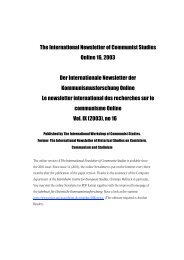VOL. XVI (2010), NO 23 - The International Newsletter of Communist ...
VOL. XVI (2010), NO 23 - The International Newsletter of Communist ...
VOL. XVI (2010), NO 23 - The International Newsletter of Communist ...
Erfolgreiche ePaper selbst erstellen
Machen Sie aus Ihren PDF Publikationen ein blätterbares Flipbook mit unserer einzigartigen Google optimierten e-Paper Software.
<strong>The</strong> <strong>International</strong> <strong>Newsletter</strong> <strong>of</strong> <strong>Communist</strong> Studies Online <strong>XVI</strong> (<strong>2010</strong>), no. <strong>23</strong> 146<br />
began to be copied, it gave birth to personality cult, centralisation <strong>of</strong> power in a dictatorial<br />
style and the consolidation <strong>of</strong> a party <strong>of</strong> the Stalinist type, together with the consolidation <strong>of</strong> a<br />
model <strong>of</strong> socialism without democracy. Voices <strong>of</strong> dissent, represented, for instance, by Liu<br />
Shaoqui, were brutally silenced.<br />
This is a new interpretation for three reasons. One: Mao’s voluntarism and subjectivity has<br />
been considered in a positive light by many third world scholars, oriented towards ultraleftism.<br />
<strong>The</strong> way Peters examines it and views it as a departure from Lenin deserves serious<br />
consideration. Two: the author’s repeated and categorical formulation that many <strong>of</strong> Mao’s<br />
problems were rooted in the fact that he was deeply influenced by Stalin contests a wellknown<br />
position that Mao consciously distanced himself from Stalin and that it was not Mao<br />
but persons like Wang Ming, with whom Mao had serious differences, who were actually<br />
Moscow’s men in the CPC. Three: <strong>The</strong> way the author has highlighted the historical and<br />
theoretical importance <strong>of</strong> the concept <strong>of</strong> New Democracy, together with its possibilities, which<br />
remained incomplete, provides a new understanding <strong>of</strong> many <strong>of</strong> the problems that China had<br />
to face after the victory <strong>of</strong> the 1949 Revolution.<br />
<strong>The</strong> death <strong>of</strong> Mao and the consequent ascent <strong>of</strong> Deng, eventually followed by his death and<br />
the rise <strong>of</strong> the Hu Jintao / Wen Jiabao leadership have certainly witnessed a reversal <strong>of</strong> the<br />
Maoist strategy but the situation in today’s China remains extremely complicated. <strong>The</strong> author<br />
has made a detailed study <strong>of</strong> all the Congresses <strong>of</strong> the CPC, including the latest 17 th<br />
Congress, held in October, 2007. Although in most <strong>of</strong> the current discussions on China the<br />
CPC’s emphasis on building a “harmonious socialist society” is highlighted, the way the<br />
author has addressed the issue <strong>of</strong> corruption with reference to the new perspective <strong>of</strong> the<br />
CPC on this question deserves serious attention. Thus, the roots <strong>of</strong> corruption are being<br />
traced to absence <strong>of</strong> true inner-party democracy and it is now being said that, since it is high<br />
concentration <strong>of</strong> power that largely explains corruption, a reform <strong>of</strong> the existing system <strong>of</strong><br />
political power is the need <strong>of</strong> the hour (p. 511).<br />
<strong>The</strong> author’s own estimation <strong>of</strong> the present-day Chinese society is made unambiguously<br />
clear. He considers it as one which is neither socialist nor capitalist in character. He views it<br />
as a society which, economically, corresponds to a special kind <strong>of</strong> state capitalism, while its<br />
political structure is a manifestation <strong>of</strong> the power <strong>of</strong> the CPC (p. 561). While this may appear<br />
to be a debatable proposition to many, the conclusion drawn by the author would certainly<br />
provide food for thought to concerned China scholars.<br />
<strong>The</strong> author’s meticulous study <strong>of</strong> documents <strong>of</strong> the CPC is amazing. <strong>The</strong> most positive<br />
aspect <strong>of</strong> the book is that his excellent coverage <strong>of</strong> documents has helped him build up a<br />
credible narrative but he has not confined himself to a story line. He goes beyond the<br />
storyline, as he breaks it up, through a rigorous theoretical exercise, analytically on the level<br />
<strong>of</strong> scholarly interpretations. One only wonders why such an excellent study has not been<br />
followed up by an index and a bibliography, two most essential elements integral to such a<br />
scholarly work. This is a major gap which should have been avoided.














